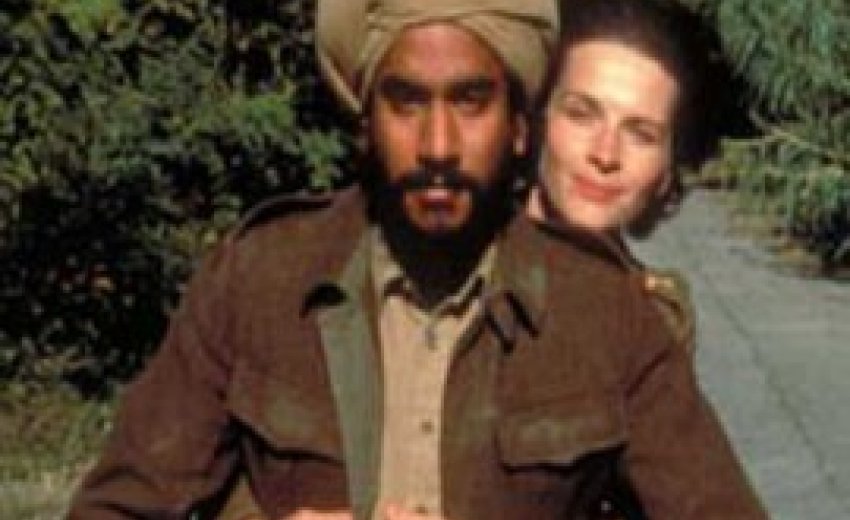 |
 |
Images: stills from "The English Patient", a film adaptation of Michael Ondaatje's award winning novel. |
Wherever I get the occasion to talk to Sikh families with young children, I request them to motivate their sons and daughters to choose media and finance as their preferred professions.
The recent fast by Bhai Gurbaksh Singh in India for the release of detainees having already completed their jail terms was literally a case study for further convincing me that media and finance are not only appropriate but also desirable choices for Sikh boys and girls.
Why so?
I watch three or four Indian TV channels blaring out 24 hour news, debates, panel discussions and interviews with experts. I did not see any report about Bhai Gurbaksh Singh’s fast on any of these channels. There was no panel discussion or interview about the cause for which Bhai Gurbaksh Singh was risking his life. He did not exist for these channels which were all the time going on about the Aam Aadmi Party, Rahul Gandhi, Narendra Modi and the like.
None of the shrill and aggressive Indian TV anchors bothered to even mention Bhai Gurbaksh Singh’s cause or the problem of so many prisoners rotting in Indian jails after having completed their full prison terms. His fast unto death was a non-event for them.
The only channels from which I was able to get news about Bhai Gurbaksh Singh on TV were the three channels being telecast from outside India: the Sikh Channel, the Sangat Channel and the Akaal Channel, all of them established by Sikhs.
I was able to see for myself the fortitude displayed by Bhai Gurbaksh Singh in his sayings. I was moved by his simplicity and devotion to the ideals of Sikhi. His transparent sincerity came through in his belief in the justice of his cause.
It was such a refreshing change from the blatant hypocrisy amply displayed on mainstream Indian TV channels by Sikh and other politicians mouthing ideals in such total contradiction to their own lives and actions.
Bhai Gurbaksh Singh shone like a beacon of sincerity and honesty amongst this ocean of false prophets and leaders who hog the limelight on most Indian TV channels with their aggressive anchors.
We have so many rich and intelligent Sikhs spread around the world. However, I find it difficult to comprehend why hardly any good movies have ever been made about the lives of Sikh households or stories written by Sikh novelists about Sikh culture and tradition.
Bollywood has traditionally caricatured the Sikhs as bumpkins, buffoons or drunkards in innumerable Hindi films. A film like "Nanak Naam Jahaaz Hai” was about a Sikh family but with a heavy dose of religious belief.
The moment any film touches upon Sikh religious aspects, it becomes subject to all kinds of objections from self styled Sikh ‘priest’, sants, politicians and fundamentalists who make more people see such films by creating controversies about them. Their own daily lives might be in total contradiction to the principles of Sikhi but they become fervent guardians of Sikhi in such matters.
My wife, a non-Sikh, has asked me several times about the flagrant paucity of good non-religious theme films about Sikh history and culture. She feels it is a pity that handsome looking Sikhs are not shown in films about Sikh heroes of which Sikh history has such shining examples.
Frankly, I do not know why this is so.
A Hollywood film, "The English Patient”, generated more interest about Sikhs in Switzerland than any action undertaken (if at all) by any Sikh jathedar or leader.
This film showed a Sikh as a capable army officer in a sapper unit doing efficient work in removing mines and unexploded bombs in Italy in World War II. I got so many questions about my religion from several Swiss people who had watched this film. Many of them would walk up to me in trains or on the street in the days after the release of this film in Switzerland to tell me with a touch of pride, “You are a Sikh”.
It showed me the necessity of making more such films showing Sikhs in every day life situations, having nothing to do with religious themes.
Why are rich Sikhs not financing more such films?
Even at the cost of sounding banal, I cannot help but cite the example of the presence of Jews in media and finance as a contrast to that of Sikhs in these fields.
Jews and Sikhs are both minorities in most places where they live. Of course, the Jews have the sovereign state of Israel since 1948. The number of Jews is slightly less than the number of Sikhs in the world. But just look at how they are perceived, thanks to their strong presence in the fields of media and finance and how we are perceived.
The cause for which Bhai Gurbaksh Singh put his life at risk should be a universal human right, yet I did not see any coverage of this at all on any channel other than the three channels set up by Sikhs.
Now contrast this to what happens in Israel or to events affecting the Jewish community in France or other countries around the world. Both Jews and Sikhs have been and are the victims of gross injustice and physical attacks in so many places.
Just observe the difference in the attention the media devote to events concerning them.
Just bemoaning how badly Bollywood films depict Sikhs will not serve any purpose unless Sikh boys and girls start going into media in a big way and projecting a different image of Sikhi through their creations.
I believe a start has already been made in this direction through the holding of Sikh film festivals in Canada and the US but this trend has to be generalised. This will require financing which is precisely where the other string to the bow comes in: finance.
We need a strong presence of Sikh men and women in the financial world to ensure that media projects envisaged by Sikhs obtain the necessary funding without which films about Sikhs cannot move to the next level in terms of quality.
Once Sikhs become strong in media and finance, Sikh youngsters, both boys and girls, could be provided better job opportunities in these sectors. Once such opportunities start appearing, it could motivate more Sikh youngsters to focus more on education geared towards entering these fields. The armed forces and agriculture have been two domains in which Sikhs have been traditionally very present. Both these sectors are now limited in scope.
The Indian government follows a policy of linking recruitment in the armed forces to the percentage of different communities in the Indian population while overseas governments impose severe restrictions on Sikhs with turbans being able to serve in their armed forces. However much such restrictions appear unjust and unjustified, which they are, we cannot wish them away.
Agriculture is becoming more and more capital intensive everywhere. There has been severe fragmentation of land holdings in Punjab. From what I have been personally able to see in the Indian Punjab, more and more Sikh youngsters spend their time in cities, enjoying the “good” life by selling off land at high prices rather than personally cultivating their lands.
Sikhs in Punjab keep complaining about the influx of Biharis, totally ignoring that there would be severe shortage of manpower in the agricultural sector there if the Biharis were not to come and work in their fields.
Alternative sources of employment have to be found for Sikh boys and girls. Media and finance should be their priority choices of profession. For this, the quality of education imparted to them needs to drastically improve. Competition in both these sectors is fierce. They will need to be amongst the best candidates available for positions with internationally reputed firms in media and finance.
Good work is being done by Sikh educational trusts, foundations and similar organisations by setting up educational institutions especially for Sikh girls. Many such institutions concentrate their curriculum on imparting knowledge about Sikh religion by making students participate in early morning prayers and meditation.
This has to be accompanied by improvement in the quality of education which needs to be up to international standards of excellence. For this they need good teachers and facilities which need proper remuneration which comes from proper financing which comes from donors and financing institutions providing funding which implies that such funders need to be convinced of the validity of the project which they are being asked to fund which would become easier if there was a much stronger presence of Sikh men and women in deciding positions in media and finance.
We can turn this paradigm around whichever way we want. There is no escaping hard reality.
Unless we have a strong presence in media and finance, Sikh demands for justice and correct media image will continue to suffer the way they are suffering till now.
During my travels to various countries I do come across many Sikhs working in the financial sector but very few active in the media. Also, those active in the media in India are not exactly shining lights to be emulated. Some of them just seem to delight in projecting the image of Sikhs as whisky guzzlers as if drinking copious amounts of alcohol were a badge of honour to be worn with pride.
It is a mark of shame.
We need responsible journalism which will come with sensible, well educated Sikh boys and girls entering the media in large numbers. Many of them will be motivated to set up new journals, TV companies, film making companies. There will be several failures and not just successes. What is essential is to make media and finance as priority professional choices for aspiring Sikh boys and girls.
A Jewish friend told me that Jewish families used to choose successful Jews having lived through not just one but two bankruptcies as desirable matches for their daughters since such men had proven their resilience by losing everything but still getting back on their feet not just once but twice.
This story might not be true but it shows the right spirit.
The role of parents becomes crucial here. They have to first themselves be convinced that media and finance are desirable choices of profession for their children. I know of several cases of my contemporaries who were pushed by their parents to go in to the bureaucracy or the police in India.
Media and finance should start outranking the bureaucracy, armed forces, the police and other career choices in the minds of Sikh parents when they envisage professional futures for their children. Only then could the drivel being dished out by Bollywood about Sikhs be effectively countered.
Just consider some of the recent films released about Sikhs like "Son of Sardaar” or "Singh Sahib the Great”. The level of imbecility of such films as to be seen to be believed. "Singh is Kinng” was another shining example of undiluted stupidity. A surprising contrast was "Bhaag Milkha Bhaag” which showed the hard work and dedication put in by the finest athlete India has produced till now, Milkha Singh.
Just imagine how many more such examples Sikhs have to show.
The rise of the internet offers several new avenues to Sikh youngsters to display their creative talents in the media but unless they occupy a major place in mainstream film industry, Sikhs will continue to suffer from a distorted image perception.
The way ahead is not going to be easy. Nothing has been easy for us in our history till now. It will need concerted efforts by Sikh parents and educational institutions to motivate Sikh youngsters to focus on media and finance as career choices.
For this, Sikhs who have succeeded in these two fields should take time to set examples for Sikh youngsters by talking to them. Different Sikh organisations should invite such successful professionals to talk to Sikh youngsters to show that success can be achieved without abandoning their articles of faith.
On the positive side, Sikh organisations in the US are doing very good work in informing Americans about Sikhi and what it stands for. This has already led to a reduction in cases of harassment inflicted at airports in the US on Sikh passengers because of ethnic profiling.
Politicians in countries where Sikhs live will also be more receptive to acceptable Sikh demands if they know that Sikhs are well represented in media and finance.
Once again, the example of Jewish organisations acting as major financial contributors and lobbying groups in the US comes to mind. Sikhs will be taken more seriously if they are strong in media and finance.
There are some extremely successful Sikh bankers and financial specialists. Their achievements should be highlighted by the Sikh media as an example to Sikh youngsters for future career choices.
Such developments will not happen overnight. They will take time, maybe even a generation. But they are essential if we are not to continue to wallow in our present situation of being the butt of jokes, distorted images and misconceived perceptions.
Our future orientation lies squarely in our own hands.
It will be a test of our collective wisdom and sagacity whether we manage to guide our youngsters towards media and finance as preferred career choices or not.
January 3, 2014
